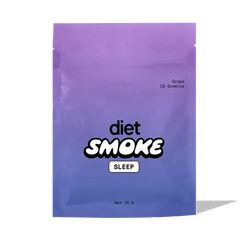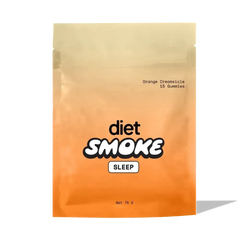When it comes to improving sleep, both Delta-8 and Delta-9 THC are cannabinoids that interact with your body's endocannabinoid system. Here's what you need to know:
- Delta-8 THC: Known for its mild effects, it provides relaxation and a gentle transition into sleep. It's less intense, making it a good option for new users or those sensitive to THC.
- Delta-9 THC: Offers stronger psychoactive effects and sedation, helping with faster sleep onset and deeper rest. It's better suited for experienced users or those needing significant sleep support.
Key Differences:
- Delta-8 is about half as strong as Delta-9.
- Delta-8 is less likely to cause anxiety or paranoia.
- Delta-9 is more effective for deep sleep but may disrupt sleep cycles with prolonged use.
Quick Tip: Start with a low dose, especially if you're new to THC, and choose lab-tested products to ensure safety and accurate dosing.
Quick Comparison
| Factor | Delta-8 THC | Delta-9 THC |
|---|---|---|
| Potency | Milder, about half as strong | Stronger, more intense effects |
| Sleep Effects | Gentle relaxation | Strong sedation |
| Side Effects | Fewer issues with anxiety | Higher risk of anxiety/paranoia |
| Best For | Beginners, light sleep support | Experienced users, deeper sleep |
Delta-8 offers a gentler experience, while Delta-9 delivers stronger effects. Choose based on your sleep needs and tolerance.
Delta-8 Sleep Gummies Vs Delta-9 Sleep Gummies
What Are Delta-8 and Delta-9 THC?
Delta-8 and Delta-9 THC are cannabinoids that share nearly identical molecular structures, with one small but crucial difference: the location of a double bond. For Delta-9 THC, this bond is between the 9th and 10th carbon atoms, while for Delta-8 THC, it's between the 8th and 9th carbon atoms. This slight variation impacts how each interacts with the body's endocannabinoid system, leading to different effects.
The endocannabinoid system, which includes CB1 receptors, plays a key role here. Delta-8 THC has a weaker binding affinity to these receptors compared to Delta-9 THC, which is why it produces gentler psychoactive effects. As Dr. Peter Grinspoon, M.D., puts it:
"Delta-8 is very similar to delta-9, functioning by triggering our cannabinoid receptors in the same way that cannabis does."
A 1973 study highlighted that Delta-8 THC is about two-thirds as potent as Delta-9 THC, delivering similar effects but with less intensity. These subtle molecular distinctions pave the way for the unique experiences each cannabinoid offers.
Delta-8 THC: Mild and Relaxing Effects
Delta-8 THC is often described as a more approachable option for those seeking relaxation without the stronger psychoactive effects of Delta-9 THC. This cannabinoid provides a calm, clear-headed experience with fewer adverse reactions. A 2022 study found that 71% of participants reported feeling more relaxed with Delta-8, while 68% experienced euphoria and 55% noted pain relief.
Jessica Kruger, Ph.D., who studied Delta-8 usage patterns, explained:
"Because this is one of the first studies of its kind on delta-8-THC and so many states have changed their legislation, we wanted to really explore what people felt as they were using it compared to delta-9-THC. We found that people who are utilizing delta-8-THC feel fewer negative side effects, and they are using it in modalities that are safer, like vaping or edibles or using topically."
Delta-8's calming qualities make it especially helpful for easing into sleep. Its gentler effects reduce the risk of anxiety or paranoia, making it a good choice for evening use when unwinding is the goal.
Delta-9 THC: Stronger Potency and Sedation
Delta-9 THC, on the other hand, is known for its stronger psychoactive and sedative properties. As the most potent cannabinoid naturally found in cannabis, Delta-9 THC interacts directly with the brain's cannabinoid receptors, resulting in more immediate and intense effects. This potency makes it particularly effective for those seeking deeper relaxation or sleep support.
Since Delta-9 THC is the dominant form of THC in cannabis, it is easier to extract and has been studied extensively. This research has helped refine its use, including dosing recommendations for sleep and other applications. For individuals needing stronger sedative effects to achieve restful sleep, Delta-9 THC can be a viable option. However, it's important to start with caution, as its intensity can be overwhelming for new users.
How Delta-8 and Delta-9 THC Affect Sleep
Both Delta-8 and Delta-9 THC interact with the endocannabinoid system, influencing how we move through the stages of sleep, also known as sleep architecture. THC is commonly associated with reducing REM sleep while increasing deep, slow-wave sleep. However, the effects vary between Delta-8 and Delta-9 THC in terms of intensity and impact. These differences can shape how each cannabinoid affects sleep onset, quality, and overall rest.
"THC appears to play the most active role in modifying sleep stages, and time spent in specific stages of sleep." - Dr. Michael Breus, Clinical Psychologist, Sleep Medicine Expert
Delta-9 THC for Deep Sleep
Delta-9 THC stands out as a stronger option for promoting sleep, particularly for individuals struggling to fall asleep. Research shows that Delta-9 THC shortens the time it takes to drift off by more effectively activating CB1 receptors compared to Delta-8. In a survey of 1,200 participants, over half reported that Delta-9 THC helped them sleep more deeply by calming both the body and mind. This mental relaxation plays a key role in extending time spent in deep, slow-wave sleep, which is crucial for both physical recovery and mental rejuvenation. However, it’s worth noting that prolonged use of Delta-9 THC might eventually reduce slow-wave sleep, so moderation is advised.
Delta-8 THC for Gentle Relaxation
Delta-8 THC offers a softer approach to sleep support, making it ideal for those who prefer a more gradual transition into rest. Its effects are milder and less sedating, helping users relax without feeling overly drowsy or groggy. Unlike the stronger, head-focused intensity of Delta-9, Delta-8 provides a balanced sense of calm. According to research, 71% of Delta-8 users report feelings of relaxation, while 68% experience euphoria - both of which are helpful in preparing the mind and body for sleep. Additionally, Delta-8’s gentler effects are less likely to disrupt natural sleep cycles, making it a suitable choice for consistent use or for those sensitive to more potent cannabinoids.
sbb-itb-0d19bd1
Delta-8 vs Delta-9: Which Is Right for You?
When it comes to sleep, choosing between Delta-8 and Delta-9 THC boils down to personal needs and preferences. Both cannabinoids can help with sleep, but they work in distinct ways and cater to different types of users. Here's a closer look to help you decide which fits your lifestyle best.
Side-by-Side Comparison for Sleep
| Factor | Delta-8 THC | Delta-9 THC |
|---|---|---|
| Potency | About half as potent as Delta-9 | Twice as strong as Delta-8 |
| Sleep Effects | Gentle relaxation with a gradual transition into sleep | Strong sedation with faster sleep onset |
| Psychoactive Intensity | Milder, clear-headed high | More potent euphoric experience |
| Receptor Binding | Stronger CB2 binding (affects physical sensations) | Stronger CB1 binding (supports sleep induction) |
| Best For | New or sensitive users | Individuals needing stronger sleep support |
| Common Side Effects | Fewer issues with anxiety and drowsiness | Higher risk of anxiety, paranoia, and panic attacks |
| Daytime Use | Suitable for daytime therapeutic use | Primarily recommended for nighttime use |
This table highlights the main differences, making it easier to weigh your options.
What to Consider Before Choosing
Your decision shouldn't just hinge on potency or sleep effects. Think about your experience level and how each cannabinoid aligns with your needs. For beginners, Delta-8 offers a gentler introduction, while seasoned users or those seeking stronger sleep support may lean toward Delta-9.
Delta-9 THC is known for reducing sleep latency by binding strongly to CB1 receptors. On the other hand, Delta-8 provides a more subtle relaxation, avoiding the heavy sedation that some users find overwhelming.
Factors like body weight, tolerance, and mental health also play a role in how you respond. Some users may experience anxiety or paranoia, and regular use can lead to a need for higher doses over time. Side effects such as confusion, dizziness, and drowsiness are possible with both cannabinoids , though Delta-8 generally causes fewer intense reactions. However, it's worth noting that Delta-8 products are often unregulated and may carry risks of contamination due to manufacturing practices .
If you're new to THC, start with a small dose and increase gradually. Always buy from reputable sources that provide third-party lab testing . Avoid driving or operating machinery after use, and consult a healthcare professional if you have any pre-existing conditions .
Diet Smoke's THC Products for Sleep

Diet Smoke has crafted THC products designed specifically to support better sleep. Their lab-tested gummies are formulated to help improve sleep quality, offering precise doses of cannabinoids to ensure restful nights.
Delta-8 and Delta-9 Sleep Gummies
Diet Smoke features three unique gummy options tailored for sleep. The Grape Sleep Gummies ($34.00) combine 5mg of Delta-9 THC, 5mg of CBD, and 5mg of melatonin.
"With a precise blend of Delta-9 THC, CBD, and melatonin, they work naturally with your body to promote a sense of calm and relaxation before bed."
For those who prefer a more potent option, the Mood Melt Orange Gummies ($44.00) pack 30mg of THC alongside 5mg of CBD. On the other hand, the Evening Drift Gummies ($38.00) offer a milder choice with just 2mg of THC. Whether you're looking for the gentle effects of Delta-8 or the stronger sedative properties of Delta-9, Diet Smoke provides options to suit different sleep preferences and needs.
How to Use THC Products for Sleep
To make the most of these products, take them 30–60 minutes before bedtime to allow the cannabinoids to take effect. Start with a low dose, such as 2–5mg, and gradually increase in 2.5mg increments until you find the right level for your needs. Since the effects can last anywhere from 6 to 24 hours, it's best to plan for 7–8 hours of uninterrupted sleep.
THC supports sleep by activating CB1 receptors. If you notice side effects like anxiety or a racing heart, stay calm, try deep breathing exercises, and consider using a CBD product to help balance out the effects.
Conclusion: Choosing Between Delta-8 and Delta-9 for Sleep
When deciding between Delta-8 and Delta-9 THC for sleep, it all comes down to your personal needs and how experienced you are with THC. Delta-9 THC is often favored for its stronger sedative effects, thanks to its ability to bind more effectively to CB1 receptors, which can promote deeper sleep.
Natural Ways CBD highlights the differences between the two cannabinoids:
"Delta 8 THC creates a mild head high that's energizing and uplifting. Delta 9 THC creates a more potent euphoric experience that tends to be deeply relaxing. While delta 8 THC is great for daytime therapeutic use, delta 9 THC tends to be better for sleep support and nighttime use." - Natural Ways CBD
This insight can help guide your choice based on the type of sleep support you're looking for.
For those new to THC or who prefer a gentler option, Delta-8 THC could be a better starting point. It's about half as potent as Delta-9, offering a milder experience that's less likely to overwhelm. On the other hand, if you're seeking a more powerful sedative effect to aid with nighttime rest, Delta-9 THC might be the better fit.
Beyond choosing the right cannabinoid, the quality of the product is just as important. In the U.S., many cannabis products are mislabeled, so opting for lab-tested options is crucial. Diet Smoke, for example, emphasizes third-party lab testing to ensure accurate dosing and the absence of harmful contaminants.
"Lab testing ensures accurate cannabinoid concentrations and detects contaminants." - Wishing Wellness DC
With Diet Smoke’s selection of lab-tested gummies designed for sleep, you can explore both Delta-8 and Delta-9 options with confidence. Whether you're drawn to Delta-8's gentle relaxation or Delta-9's stronger sedative effects, starting with a low dose and adjusting gradually can help you find the right balance for your sleep needs.
FAQs
What’s the difference between Delta-8 and Delta-9 THC when it comes to improving sleep?
Delta-8 and Delta-9 THC can both support better sleep, but they achieve this in slightly different ways. Delta-9 THC is known for its stronger potency, often delivering more pronounced sedative effects. This can lead to deeper and more restorative sleep but may feel overwhelming for some, particularly at higher doses.
In contrast, Delta-8 THC provides a softer, more soothing experience. It helps you unwind and drift off to sleep without the intensity that Delta-9 can bring. This makes Delta-8 a good option for those seeking a gentler way to improve their sleep.
Ultimately, both cannabinoids can be beneficial for sleep, but the ideal choice comes down to your preferences and how your body reacts. Start with a small dose and gradually adjust to find what works best for you.
What are the risks or side effects of using Delta-9 THC for sleep, especially with long-term use?
Using Delta-9 THC as a sleep aid isn’t without its risks, especially when used over an extended period. Over time, some individuals might develop a tolerance or even dependence, requiring larger doses to experience the same effects. This can lead to unwanted side effects, including impaired cognition, dizziness, anxiety, or even disrupted sleep patterns with continued use.
For those who stop regular use of Delta-9 THC, withdrawal symptoms like insomnia or mood changes may occur. There’s also the potential for cardiovascular concerns, such as an increased heart rate, which could pose risks for certain people. Before considering Delta-9 THC for sleep, it’s essential to consult with a healthcare professional to ensure it’s a safe and appropriate choice for your situation.
What should beginners consider when choosing between Delta-8 and Delta-9 THC for better sleep?
If you're new to THC, Delta-8 THC might be a good place to start when looking for sleep support. It tends to offer a milder, calming experience with a lower chance of triggering anxiety or paranoia. On the other hand, Delta-9 THC is stronger and can be highly relaxing, making it effective for sleep, but it also comes with more intense psychoactive effects.
For a safe and pleasant experience, begin with a low dose, especially if THC is new to you. Be sure to read product labels carefully to check potency, and confirm that the products are lab-tested and meet federal legal standards in the U.S.





